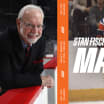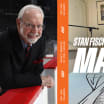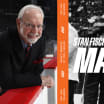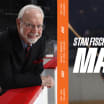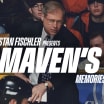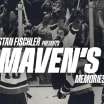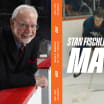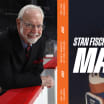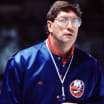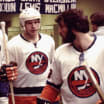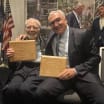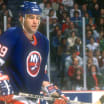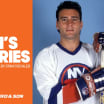Maven's Memories: The Unheralded Lorne Henning
From the 1972 Draft to setting up the first Stanley Cup clinching goal, Lorne Henning's Islanders journey
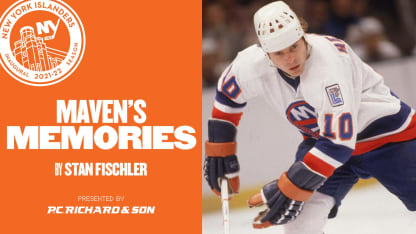
"Lorne did the most incredible job of holding the other team in check and not let them score. And with that and the other good things he did, he never got the recognition that he deserved."
So maybe this is the best time to acknowledge the many talents Henning brought to the table:
1. Picked 17th overall in the 1972 Entry Draft, the Melfort, Saskatchewan native was with the Nassaumen from Day One.
2. Henning goes down in Islanders history as the franchise's best penalty-killer. He worked with just about every PK partner from Ed Westfall to John Tonelli to Billy Carroll.
3. Total team player extreaordinaire. Or, as Nystrom put it, "You never heard a negative work out of him."
4. At opportune times, he showed a knack for making the right move at the right time. "I was so happy that he was able set up the (1980)
Cup-winning goal," add Ny.
Some published hockey historians have acnowledged Lorne's value to the team. Writing in his definitive A to Z scouting report, "Players," author Andrew Podnieks found Henning's forte:
"He was not big but he was an essential component of the team as it evolved," Podnieks wrote, "first as a competititve team, then as a challenging team and finally as a Stanley Cup team."
Right from the get-go, Henning quietly made an impression and his value appreciated in relatively unusual ways. Publisher Stu Daniels, who created one of the team's first publications, "The Triumphant Islanders," called Henning, "One of the most underrated yet important members of the team."
To reach The Show, this unassuming Western Canadian paid his hockey dues the hard way -- in rugged Saskatchewan Junior ranks.
"Playing Western League hockey in those days was tough stuff," Henning once told me. "We travelled by bus and made long, long trips to distant towns like Flin Flon Manitoba and Prince Albert, Saskatchewan.
"Competition was keen and often rough. But we also knew that we were on the road to the NHL; assuming that we had the goods."
For Henning, it was starting in Estevan, Saskatchewan where he toiled for three seasons. NHL scouts focused on his third season, 1970-71, with Estevan's Bruins.
"That's when I knew I had an offensive potential that rounded out my style," Henning explained. "At one point, I was averaging two points a game."
The arithmetic was encouraging. He played 66 games, scored 64 goals and added 66 assists for 130 points. A season later he moved to a warmer climate in New Westminster, British Columbia.
"The goals didn't come as easy," Lorne recalled, "but I did go over the 100 point mark again."
He played 60 games for New Westminster for 51 goals, 63 assist and 114 points. His two-way game was impressive and low penalty total was another point of honor.
In his autobiography, "The Road To Hockey Town," the Islanders superscout Jim Devellano praised GM Bill Torrey for selecting Henning in the Entry Draft.
"We had a nice mix of players," wrote Devellano, "and Lorne was part of it. He was one of the Originals who'd help us get better and better."
Except for two short minor league stints -- New Haven and Fort Worth -- Henning became a full-time Islander for the 1974-75 season. Not so coincidentally, it was the Isles first playoff season.
But even before that the Islanders enjoyed brief moments of glory. Henning, for one, never forgot the game at Boston on January 18, 1973.
"Prior to that one," Lorne remembered, "we had lost a dozen games in a row. Meanwhile, next we're playing the defending Cup champs, the Bruins. It seemed like a no-brainer win for Boston.
MAVEN'S MEMORIES
WRITTEN COVERAGE
Wayne Merrick Makes Mark on Cups
Don't Forget Tomas Jonsson
The Underrated Stefan Persson
Stan's Favorite Clark Gillies Memories
From Doghouse to Penthouse in 1975
Al Arbour's Trifecta
Giving Away the Banks of Gifts -- Almost
Ken Morrow's Moments
Maven's Haven
"It was un-real. We went up 5-0; then they rallied to make it 5-4; but we came back and went up 7-4 and wound up winning the darn thing, 9-7."
To this day, it's remembered as the first colossal upset in the club's history.
Henning: "Guys were sitting on our bench with dazed looks on their faces. I don't think anybody could have been as surprised as our players were.
"Boston changed goalies twice in that game. Eddie Johnston started, was lifted and then came back again. It's the only time I've ever seen that."
In time the Islanders would grow and Henning would grow with them. The 1975 playoff series win over the Rangers was merely the start of something big.
Goalie Glenn (Chico) Resch played a pivotal part of the Islanders growth and keenly remembers how vital Hening was to the upward climb.
Resch: "Lorne was the ultimate team and role player. Everyone liked and respected him. He had a generous bit of skill and then enabled Al to move him up and down the lineup. Actually he didn't look out or plade whether he was replacing Bryan Trottier or Butch Goring for a few games. The truth is that Henning lacked a mean, physical edge in order to play a more prominent role.
"But he was one of our most important penalty-killers; could win face-offs and was very smart. Plus, he was tough when it came to blocking shots. He communicated well with everyone and that's why Radar eventually added him to the coaching staff. Looking backward, I'd say that Lorne was much better than the first impressions. Finally, I have to say that he had the perfect personality to keep the dressing room light and healthy."
"Pretty soon," said Henning, "getting into the playoffs was expected of us. But Toronto knocked us out in '78 and then the Rangers a year later. By the time training camp rolled around in September 1979 we began wondering if we'd ever make it to the Cup.
"But the moves Bill (Torrey) made that season changed the whole texture of the team."
The three additions -- chronologically -- were rugged defenseman Gord Lane; 1980 USA Gold Medal Olympic hero defenseman Ken Morrow and, finally, peripatetic center Butch Goring.
"This 1980 playoff was different," Henning added. "We got through the first three rounds and then had Philly down three games to two. T Game Six, back at the Coliseum went into overtime."
Normally, Lorne wouldn't have played a part in that decisiive match. Arbour normally would use three centers, Bryan Trottier, Butch Goring and Wayne Merrick. Henning was the utility forward.
Merrick centered a trio with Bob Nystrom and John Tonelli; otherwise known as The Banana Line. As a unit, it was a group that played a good 200-foot game. Except that Merrick came down with a charley horse and had to be scratched from Game Six.
Although Henning played only 39 games that season -- he had been releagated to swingman center -- Arbour had no qualms about inserting Lorne between Nystrom and Tonelli.
"Lorne was in a supporting role but he always was ready," said Arbour.
Henning would prove Radar's point after the Flyers twice came close to winning the game early in the sudden-death period. But Billy Smith was strong in goal and now Arbour had the Henning unit out for a series-changing turn. The Cup play.
The Cup-winning rush started innocently enough with Henning in command at center ice. Seeing Tonelli speeding down right wing -- John's wrong side -- Lorne nevertheless skimmed a pass toward the boards.
Yet, Flyers defenseman Moose Dupont had lined up Tonelli. For a moment it appeared as if Johnny T would be checked.
Tonelli: "I saw out of the corner of my eye that Ny was breaking to the net and I tried to shovel the puck to him right away."
Now Lorne was watching the melodramatic play unfold.
Henning: "Bobby had gotten a half-step on their big defenseman Bob Dailey and that put him in position to get behind Dailey and make the play on goal. All Ny had to do was tick the pass with his backhand."
Flyers goalie Pete Peeters reacted to the play a split-second too late as the six-ounce hunk of vulcanized rubber soared over the goalie.
The Islanders had won The Stanley Cup and Henning got his most memorable assist on the play.
"I was with them at the beginning and I'm with them for the first Cup," Lorne concluded. "I couldn't have been happier!"
(POSTSCRIPT: Henning also helped the Isles to a second Cup. He then became Arbour's aide for two seasons after which he left the Island to launch his own coaching career in Springfield.)

